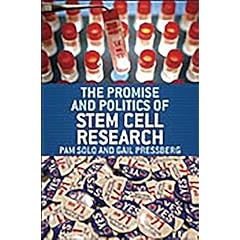 Gail Pressburg, co-author of The Promise & Politics of Stem Cell Research with Pam Solo, discussed the so-called politics of embryonic stem cell research on January 11 at a D.C. bookstore which was aired on C-Span. A couple of things stood out to me during her presentation:
Gail Pressburg, co-author of The Promise & Politics of Stem Cell Research with Pam Solo, discussed the so-called politics of embryonic stem cell research on January 11 at a D.C. bookstore which was aired on C-Span. A couple of things stood out to me during her presentation:1. Anyone who disagrees with funding embryo-destructive research is just playing politics (according to the interview). It would be one thing to be told that those of us who are against the research are simply in error with our ethical analysis. But instead of challenging our arguments, we are reduced to players in a political game. Why not address our arguments instead of suggest that we have no argument at all? And by the way, no proponent of ESCR can say that this is not embryo-destructive research, as this accurately describes that the embryo is destroyed. But perhaps embryo-destructive research too kindly describes it, perhaps instead it should be referred to as human-destructive research.
2. "Five-day old cells." Gail, are you afraid to use the word embryo? After all, the name of the research establishes that it is embryos from which the stem cells are being harvested. Let's not be coy. As well, since when do we allow an age category to be applied to what are [claimed to be] just clumps of cells/embryo? This effort to disguise the personhood of the embryo by referring to it as just cells is disingenuous. And combining this cellular way of talking about the embryo and the fact of age with the admission "well they'll just be thrown away anyway" is nothing less than conceding to the fact that these are human beings at the beginning stages of life. "They'll just be thrown away" is not an ethical argument for why the research should be pursued, it only describes an unfortunate circumstance related to the error we have all made in the pursuit of IVF.
3. Perhaps the book speaks to this issue, but why in your presentation did you avoid discussion of SCNT (somatic cell nuclear transfer)? Those unfortunately afflicted with juvenile diabetes will require genetically compatible stem cells. Embryos in storage that are left over from IVF treatments will not be their answer, and women will be asked to risk their own health to donate eggs through which clones are created and stem cells are harvested. Not only do we lack substantive evidence that embryonic stem cell research is a viable option, we are even less sure about the cloning process. Advocates of human dignity know better that embryonic stem cell research is never a viable option because it destroys human life, that human cloning is an erroneous step as it creates life for it's intended destruction, and that other avenues offer more hope without the ethical baggage.

No comments:
Post a Comment